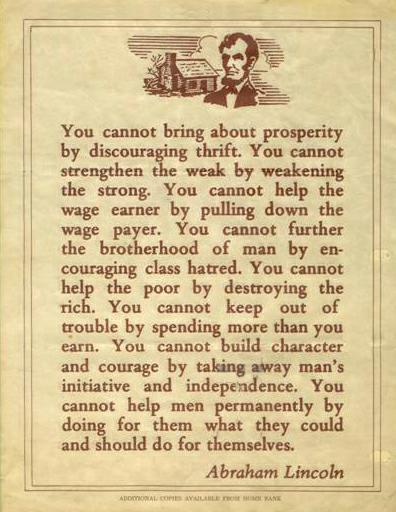This was accompanied by a blurb that we should all think about these wise words from a great man.
Now I haven't taken a history class since 1999, but something about the language struck me as funny. I wasn't sure, but it didn't sound like Lincoln to me. Thusly, I ran to the Google and took a look around. I found the Snopes page and the Illinois Historical Society site...both confirmed my suspicions. Lincoln never said that.
Back then I was young and naive, so I blithely left a link for my friend letting him know the author was wrong, and that it was actually William Boetker who said it. A few days later, I decided to check if anything else had happened with the post....and found that he had deleted me as a friend, deleted my comment, but left the post up.
It was baffling to me that someone could take that much offense not because I had disagreed with the content, but because I had pointed out a legitimate factual error in something he was citing. It was my introduction to this sort of thing (which I think has become more common as the internet has grown) but it gets me every time. Obviously I understand why people want their opinions to be right, but must everything that defends ones point be true?
I've had a few other incidents like this recently, and so I was really interested to hear about this study done in partnership with Slate.com, where they presented people with photos of political events since 1999. The twist was the 5 of the possibilities (participants were given a random sampling of 4) were doctored photos depicting events that never happened. They were then asked if they either saw it or remembered it happening.
I'm sure you can see where this is going.
Quite a few people "remembered" the false events (all of which could be viewed as negative against a particular politician). While some merely checked the box, others had detailed memories they wrote down (ie "that was the day I lost all respect for Hilary Clinton"). What really got me interested were two things:
First, Democrats were more likely to "remember" the false events that made Republicans look bad, and Republicans were more likely to "remember" moments that made Democrats look bad. Additionally, regardless of party, the more strongly you said you remembered it, the more people couldn't recognize events as false even when they were told there was a false one out of the ones they'd remembered.
Now there are some limitations to this study*, but I wonder if it's not starting to touch on the same phenomena. Once we start to believe a piece of information is true, are we more likely to keep believing it or to consider certain points of falseness less relevant? If it aligns with our previously held beliefs, are we even more likely to do this?
Why else would you hold on to a quote/fact/etc that had a demonstrably false portion?
*Only 5% of those survey were conservative, it was Slate readers polled, nothing stopped them from looking things up during the survey

I had a situation at work not too long ago where the quote "a house divided" came up. I observed that was Abraham Lincoln quoting the Bible and the co-worker seemed genuinely astonished that it was not an original to Lincoln!
ReplyDeleteI had a friend in college who cited "eat drink and be merry" as a quote by Dave Matthews Band and was surprised they hadn't originated it. The worst part is he was a friend from church.
DeleteThat's how memory works. We do not remember an event, we remember the last time we remembered it, reassembling it. It changes slightly each time. Narratives are like massive objects in our universe, bending space and attracting smaller objects into their gravitational fields. The reasons why this works for us are both social and physical.
ReplyDeleteI remember listening to WFAN in NY late one night and hearing a New Yorker explain that he hated Danny Ainge because Ainge was a vicious cheater who tried to bite Tree Rollins's finger off. I felt superior until I confused Rollins with another player (I forget who) and falsely accused the later of Rollin's crime.